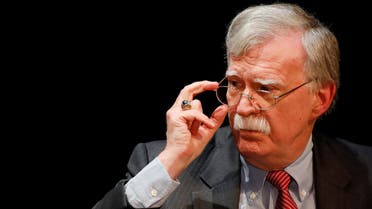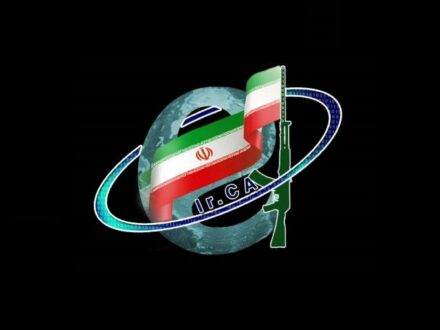Al-Arabia – The former US ambassador to the United Nations told Al Arabiya English that Iran is the “world’s biggest state sponsor of terrorism,” as Tehran-backed Palestinian, Lebanese and Yemeni armed groups continue to engage with Israel in a months-long conflict that erupted after the October 7 attack.
John Bolton, who was the National Security Advisor under Donald Trump and also served under American Presidents Ronald Reagan and George W. Bush, said that Tehran’s involvement with these proxy groups in the Middle East is part of slain Islamic Revolutionary Guard Corps (IRGC) commander Qassem Soleimani’s “ring of fire strategy” aimed at isolating and encircling Israel.

“Iran, in my category of proliferators, ranks right up there with North Korea,” Bolton said, speaking to Al Arabiya English’s Riz Khan. “I focused on Iran for a long time because of my interest in preventing the proliferation of weapons of mass destruction, particularly nuclear weapons,” he said.
A war between the Palestinian militant group Hamas and Israel broke out after the Iran-backed faction launched an attack in southern Israel on October 7, killing 1,200 Israelis and taking over 200 hostages.
In Israel’s ongoing military response, over 30,000 Palestinians have been killed, which Gaza health authorities say are mostly civilians. Israel’s indiscriminate onslaught is expected to crescendo with an assault on Rafah, which experts and NGOs say will decimate any chances of survival for the millions of internally displaced.
It would also mark an escalation in the war, which regional and international powers are hoping to subside through ceasefire proposals, which are yet to be accepted by the warring sides.
Stating that the war between Israel and the Palestinian militant group Hamas is “wider already,” Bolton accused Iran of arming its proxies with the intention of using them when Tehran would be ready for conflict.
“I think Iran has its hand on every spinning plate in the Middle East. I don’t think Hamas woke up one morning and said, let’s attack Israel,” the former US official said.
He advocated for “making the Ayatollahs in Iran pay” by establishing deterrence – a reference to Iran’s clerical rulers.
“…it may well be necessary in the ongoing conflict in the Middle East to make the Ayatollahs in Iran pay a price for their aggression. We need to be prepared to do it. If you’re not prepared to use force, you can never establish deterrence, which is the real key to peace and security,” Bolton said.
Normalization with Israel
Referencing the normalization that some GCC countries were exploring with Israel, Bolton said: “I think the general proposition that the Arab world, the Gulf Arab states in particular, have moved away from their antagonism toward Israel is a tectonic shift in the geopolitics of the Gulf that threatened Iran’s aspirations for regional hegemony and hegemony within Islam.”
Israel has strongly pushed for greater ties with its Middle Eastern neighbors and has made no secret of its hopes to normalize ties with Saudi Arabia. Still, the Kingdom has repeatedly said that it will not do so until there is a Palestinian state based on the 1967 borders with East Jerusalem as the Palestinian capital.
Before the October 7 outbreak, Saudi Arabia had signaled its intention to build formal ties with Israel provided that concessions would be made with the Palestinians, a move that would see the Kingdom join the UAE and Bahrain, two GCC neighbors who signed historic peace deals with Israel under the US-backed Abraham Accords.
Possibility of ceasefire
Qatar, which hosts Hamas’ political bureau, said it is hopeful for a pause in the war and is pushing for an agreement ahead of the Muslim holy month of Ramadan.
A ceasefire is not a novel concept in the latest war. A one-week halt in fighting in November 2023 saw more than 100 hostages freed, including 80 Israelis, who were released in exchange for some 240 Palestinians imprisoned in Israel.
Alongside Qatar, the US, Egypt, and other regional partners have been actively mediating negotiations, but it is unclear whether a truce would go into effect by Ramadan due to the mixed signals from all sides.
Adding to the mix is America’s consistent veto in the UN Security Council on ceasefire bids brought forward by Arab states.
Last week, the US vetoed a resolution that called for an immediate ceasefire in Gaza, drawing immense criticism from allies and other superpowers like Russia and China as an up-for-election President Joe Biden faces mounting pressure to reconsider support for Israel.
It says an alternate version of the resolution acceptable by the US but does not sufficiently address the ceasefire clauses is in the works.
Until then, an Israeli invasion of Rafah looms as hundreds of Palestinians could be killed at the hands of indiscriminate fire from the air and on the ground.
 Shabtabnews In this dark night, I have lost my way – Arise from a corner, oh you the star of guidance.
Shabtabnews In this dark night, I have lost my way – Arise from a corner, oh you the star of guidance.



